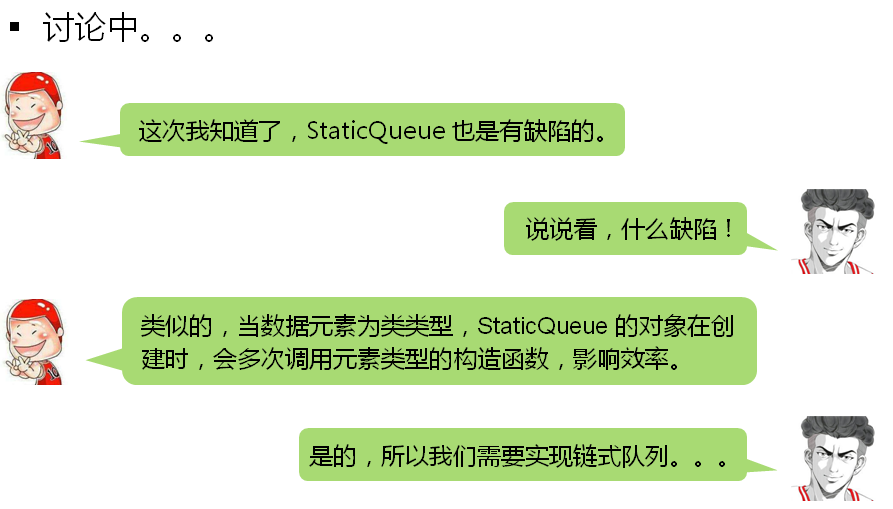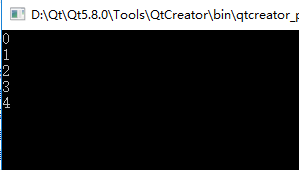



添加LinkQueue.h文件:
1 #ifndef LINKQUEUE_H 2 #define LINKQUEUE_H 3 4 #include "Queue.h" 5 #include "LinkList.h" 6 #include "Exception.h" 7 8 namespace DTLib 9 { 10 11 template < typename T > 12 class LinkQueue : public Queue<T> 13 { 14 protected: 15 LinkList<T> m_list; 16 public: 17 LinkQueue() 18 { 19 20 } 21 22 void add(const T& e) // O(n) 23 { 24 m_list.insert(e); 25 } 26 27 void remove() // O(1) 28 { 29 if( m_list.length() > 0 ) 30 { 31 m_list.remove(0); 32 } 33 else 34 { 35 THROW_EXCEPTION(InvalidOperationException, "No element in current queue..."); 36 } 37 } 38 39 T front() const // O(1) 40 { 41 if( m_list.length() > 0 ) 42 { 43 return m_list.get(0); 44 } 45 else 46 { 47 THROW_EXCEPTION(InvalidOperationException, "No element in current queue..."); 48 } 49 } 50 51 void clear() // O(n) 52 { 53 m_list.clear(); 54 } 55 56 int length() const // O(1) 57 { 58 return m_list.length(); 59 } 60 61 ~LinkQueue() 62 { 63 clear(); 64 } 65 }; 66 67 } 68 69 #endif // LINKQUEUE_H
测试程序如下:
1 #include <iostream> 2 #include "LinkQueue.h" 3 4 using namespace std; 5 using namespace DTLib; 6 7 8 int main() 9 { 10 LinkQueue<int> lq; 11 12 for(int i = 0; i < 5; i++) 13 { 14 lq.add(i); 15 } 16 17 while( lq.length() > 0 ) 18 { 19 cout << lq.front() << endl; 20 21 lq.remove(); 22 } 23 24 return 0; 25 }
结果如下:

用LinkList实现链式队列时,插入操作的时间复杂度为O(n),这是很低效的。



修改LinkQueue.h:
1 #ifndef LINKQUEUE_H 2 #define LINKQUEUE_H 3 4 #include "Queue.h" 5 #include "LinuxList.h" 6 #include "Exception.h" 7 8 namespace DTLib 9 { 10 11 template < typename T > 12 class LinkQueue : public Queue<T> 13 { 14 protected: 15 struct Node : public Object 16 { 17 list_head head; 18 T value; 19 }; 20 21 list_head m_header; 22 int m_length; 23 24 public: 25 LinkQueue() // O(1) 26 { 27 m_length = 0; 28 29 INIT_LIST_HEAD(&m_header); 30 } 31 32 void add(const T& e) // O(1) 33 { 34 Node* node = new Node(); 35 36 if( node != NULL ) 37 { 38 node->value = e; 39 40 list_add_tail(&node->head, &m_header); // O(1) 41 42 m_length++; 43 } 44 else 45 { 46 THROW_EXCEPTION(NoEnoughMemoryException, "No memory to create Node object..."); 47 } 48 } 49 50 void remove() // O(1) 51 { 52 if( m_length > 0 ) 53 { 54 list_head* toDel = m_header.next; 55 56 list_del(toDel); // O(1) 57 58 m_length--; 59 60 delete list_entry(toDel, Node, head); 61 } 62 else 63 { 64 THROW_EXCEPTION(InvalidOperationException, "No element in current queue..."); 65 } 66 } 67 68 T front() const // O(1) 69 { 70 if( m_length > 0 ) 71 { 72 return list_entry(m_header.next, Node, head)->value; 73 } 74 else 75 { 76 THROW_EXCEPTION(InvalidOperationException, "No element in current queue..."); 77 } 78 } 79 80 void clear() // O(n) 81 { 82 while ( m_length > 0 ) 83 { 84 remove(); 85 } 86 } 87 88 int length() const // O(1) 89 { 90 return m_length; 91 } 92 93 ~LinkQueue() 94 { 95 clear(); 96 } 97 }; 98 99 } 100 101 #endif // LINKQUEUE_H
如队列的操作的时间复杂度变成了O(1)。
测试程序如下:
1 #include <iostream> 2 #include "LinkQueue.h" 3 4 using namespace std; 5 using namespace DTLib; 6 7 8 int main() 9 { 10 LinkQueue<int> lq; 11 12 for(int i = 0; i < 5; i++) 13 { 14 lq.add(i); 15 } 16 17 while( lq.length() > 0 ) 18 { 19 cout << lq.front() << endl; 20 21 lq.remove(); 22 } 23 24 return 0; 25 }
结果如下:

测试程序2:
1 #include <iostream> 2 #include "LinkQueue.h" 3 #include "StaticQueue.h" 4 5 using namespace std; 6 using namespace DTLib; 7 8 class Test : public Object 9 { 10 public: 11 Test() 12 { 13 cout << "Test()" << endl; 14 } 15 16 ~Test() 17 { 18 cout << "~Test()" << endl; 19 } 20 }; 21 22 int main() 23 { 24 LinkQueue<Test> lq; 25 StaticQueue<Test, 10> queue; 26 27 for(int i = 0; i < 5; i++) 28 { 29 //lq.add(i); 30 } 31 32 while( lq.length() > 0 ) 33 { 34 //cout << lq.front() << endl; 35 36 lq.remove(); 37 } 38 39 return 0; 40 }
结果如下:

这体现了顺序队列的缺陷。而链式队列不存在这个问题。
小结:
